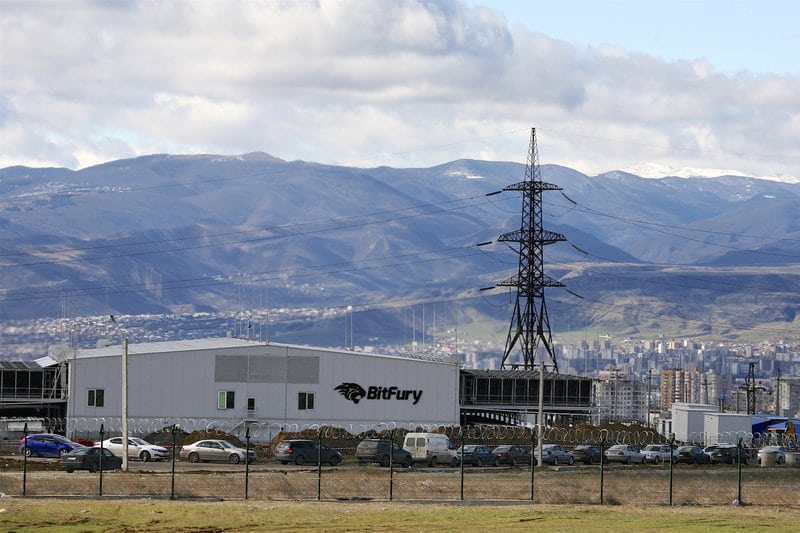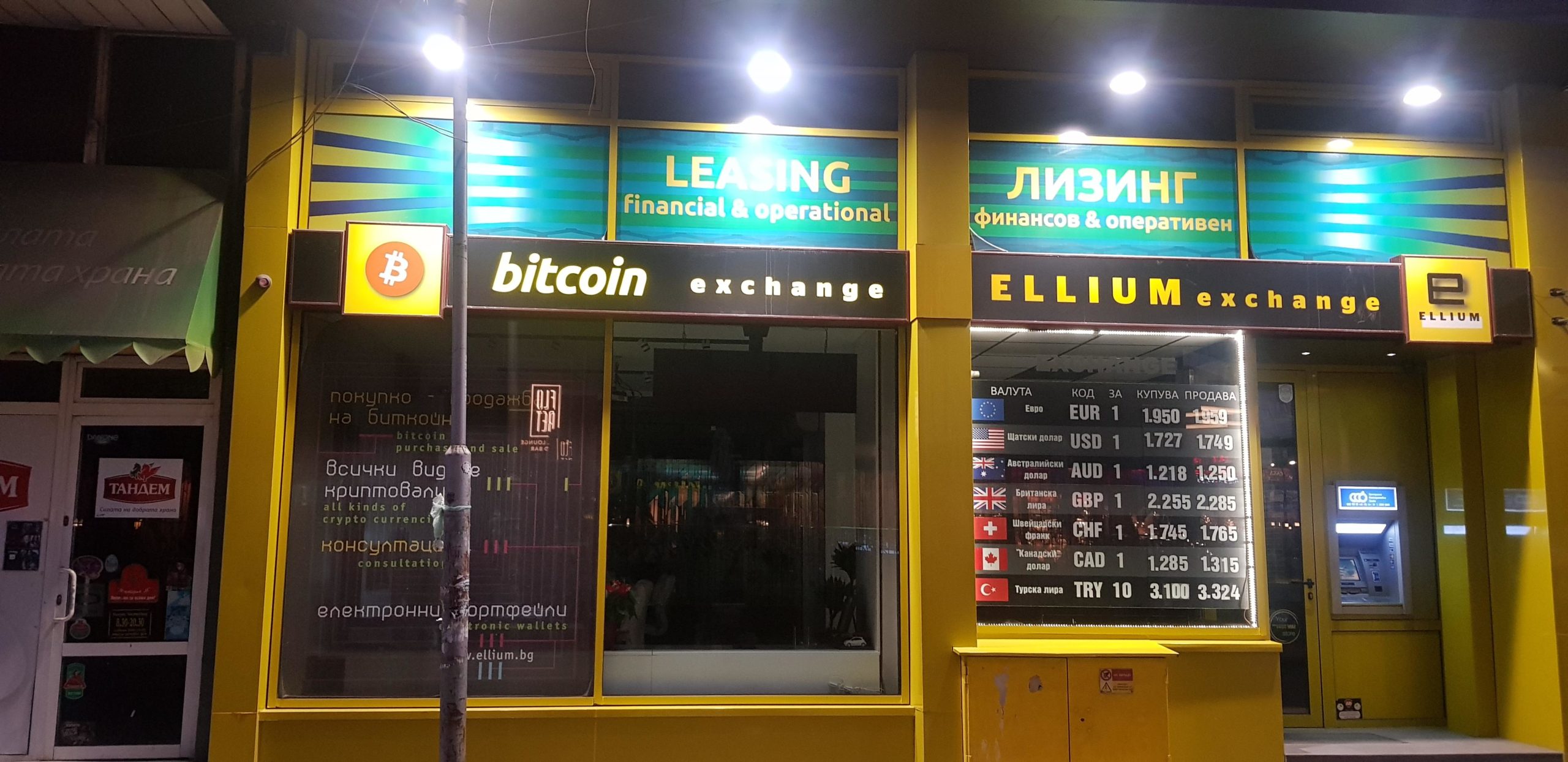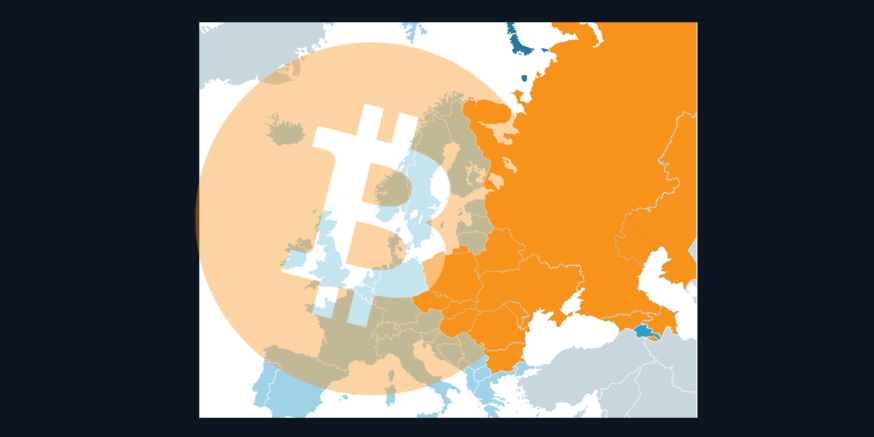- Cryptocurrency Regulation in Eastern Europe
- + The Republic of Belarus and Cryptocurrency
- - Georgia's Powerful Mining Pools
- + Czech Republic Pioneers Bitcoin Regulations
- - Russia and Cryptocurrency
- + Bulgaria's Prized Stash of Nearly $2B Bitcoin
- - Hungary and Cryptocurrency Taxes
- + Slovakia Monitors Cryptocurrency Transactions
- + Poland Forward Thinking Finance
- + Ukraine's Approach to Digital Money
- - Moldova's Legal Mining
- Cryptocurrency Mining in Eastern Europe
- Cryptocurrencies in Eastern Europe: Where to Buy and How to Spend
- The Prospects of Cryptocurrency in Eastern Europe
Cryptocurrency in Eastern Europe is history in motion.
You may be surprised by how active Eastern European countries are in the cryptocurrency space. According to Statista research, Poland, Latvia, Georgia, Estonia, and Lithuania, all ranked among the top 15 countries by the total value of alternative finance market transactions in Europe in 2018. In the same year, per capita funding for alternative online finance transactions was highest in the UK, but followed by Latvia and Estonia.
This is not the only evidence that Eastern Europe is exploring financial paradigms outside of traditional channels like central banking. One might be surprised to learn that Georgia is the world’s second-largest mining country after China, Moldova has legalized cryptocurrency mining, and Belarus is predicted to become the European Hong Kong?
This article is brought to you by Solomon Brown, Head of PR at Freewallet, to give you an idea of which countries favor Bitcoin and other cryptocurrencies, and which ones strictly forbid them. Get the full picture of the suddenly-hot crypto ecosystem of Eastern Europe.
Cryptocurrency Regulation in Eastern Europe
Most countries in Eastern Europe are split on cryptocurrency: either pro or con. Here’s a chart displaying where crypto and mining are legal (+), not legal (-) or unregulated (0).
| Country | Cryptocurrency | Mining |
| The Republic of Belarus | + | + |
| Georgia | 0 | + |
| Czech Republic | 0 | 0 |
| Russia | – | – |
| Bulgaria | 0 | 0 |
| Hungary | 0 | 0 |
| Slovakia | 0 | 0 |
| Poland | + | + |
| Moldova | – | 0 |
| Ukraine | – | 0 |
+ The Republic of Belarus and Cryptocurrency
Let’s start with the fact that Belarus has its own Silicon Valley that operates on the principle of extraterritoriality. Hi-Tech Park (HTP) is a Belarusian tax and legal zone, facilitating IT evolution, and home to 450 companies working in software development.
In 2017, the cryptocurrency activities of the residents of the HTP received full comprehensive legislative support from the government. The administration of the HTP, together with the National Bank, the Department of Financial Monitoring of the State Control Committee, international experts, and other bodies, compiled and signed all the necessary documents.
For instance, Decree No. 8 “on the development of the digital economy” legalized crypto exchanges and cryptocurrency exchange operators, mining, smart contracts, blockchain, tokens, etc.
From the moment the Decree was adopted, any transactions with tokens (mining, storing crypto, purchase, exchange) became exempt from income tax and VAT until January 1, 2023. The rules regulating the operations of companies involved in the cryptosphere have been accepted by the HTP, and the full legal regulation of cryptocurrencies in Belarus has been established. It is worth noting that only entities that are registered as residents of the Hi-Tech Park are allowed to carry out activities related to cryptocurrencies.
– Georgia’s Powerful Mining Pools
In 2019 UN statistical publications, Georgia is assigned to Western Asia, not to Eastern Europe. But, geographically it belongs to Eastern Europe and is a member of the Council of Europe. We’ve decided to include it not because of favorable crypto legislation, but due to its triumphs in mining.
A document from the Ministry of Finance notes that each unit of a crypto-asset has a market value, it can be issued, it can have an owner, its property rights can be transferred to another and divided into parts and it can be bought and sold. At the same time, the note states that, in accordance with the legislation of Georgia, a crypto asset is not a legal means of payment or electronic money.

Nevertheless, the country is experiencing a hydro-powered Bitcoin boom. According to BBC, the fact that cryptocurrency mining is “sucking its power grid dry,” doesn’t matter because of Georgia’s vast reserves of renewable hydroelectric power. Probably this reason and lack of regulations have encouraged home miners and attracted foreign businesses. According to NPR, most of the Georgian mining facilities belong to the American company Bitfury.
And although the legislation of Georgia does not regulate activities related to virtual currency, and cryptocurrency in the country does not constitute a legal means of payment, transactions of virtual money between individuals are nevertheless made. However, the government of Georgia has taken the first step towards regulating the crypto business. The multiple mining pools that will use the services of intermediary companies registered in Georgia will be subject to a value-added tax of 18%.
+ Czech Republic Pioneers Bitcoin Regulations
The Czech Republic was one of the first European countries open to operations with Bitcoin, even before the cryptocurrency market boom of 2017. In April 2015, the Czech National Bank issued a document that clarified the attitude of the state towards cryptocurrencies called, “Safety of online payments and virtual currency from the Czech National Bank point of view.” According to this document, operations with cryptocurrencies were not limited by the law of the country, only the norms of EU law applied to them.
Later on, in 2017, the Czech Republic decided to comply with the EU’s requirements for anti-money laundering and introduced the amendments to the Act on Selected Measures against Legitimization of Proceeds of Crime and Financing of Terrorism. According to the new law, all exchanges, including banks, have to verify client ID for crypto to fiat transactions amounting to €1000 and more.
– Russia and Cryptocurrency
On March 16, 2020, local news outlet Vesti.ru announced that cryptocurrency production and circulation would be banned in Russia. The issuance and circulation of cryptocurrency in Russia carries an unjustified risk, according to the bill on “Digital Financial Assets”.
The bill levied a ban on the issuance and circulation of cryptocurrency in Russia, and established penalties for violations of the ban. Nevertheless, the authorities don’t intend to ban ownership of digital currencies.
+ Bulgaria’s Prized Stash of Nearly $2B Bitcoin

The Bulgarian government sees cryptocurrencies as a financial asset (and owns 213,519 BTC confiscated from criminals, which is more than Bulgaria’s GDP). This state has neither recognized the legitimacy of Bitcoin nor declared it to be illegal. The main condition for the use of cryptocurrency in Bulgaria is the payment of a tax in the amount of 10% of the exchange or sale.
– Hungary and Cryptocurrency Taxes
Cryptocurrencies are not considered a legal means of payment in the country. According to the local news outlet Portfolio (restricted access), the government has created a special group of Hungary’s central bank, the Finance Ministry, and the tax authority that is studying the industry to develop a legal framework. All cryptocurrency transactions are filed under “other income” and taxed under Hungarian capital gains tax code, which contains 15% capital gains tax and 19.5% health contribution which is called as (EHO).
+ Slovakia Monitors Cryptocurrency Transactions
Slovakia is on the list of countries that have officially recognized Bitcoin and other cryptocurrencies. However, in 2018, the authorities tightened their stance on digital business. Following the initiative of a national regulator — the Slovak National Bank — all banks began to close the accounts of firms associated with cryptocurrencies. A similar hostile reaction from the existing financial system to digital currencies was observed in the Czech Republic and Bulgaria.
In spite of the restrictive measures, non-fiat currencies are not regulated in Slovak law in any way, and their exchange, mining, and other operations are not outside the legal framework. Like the rest of the European Union, Slovakia recognizes that cryptocurrency transactions should be monitored and taxed.
+ Poland Forward Thinking Finance
The Republic of Poland ranks 36th in the world in terms of population. It stands to reason that such a large European country is forward-thinking when it comes to finance. The attitude of local financial regulators towards investing in cryptocurrencies is quite positive. The country’s Central Statistical Office (GUS) has recognized the trading and mining of virtual currencies as an official economic activity. In a statement from 2016, the ministry stated that despite virtual currencies not being subject to any separate regulations under Polish legislation, they are fully legal and subject to income tax.
Along with that, the government supports blockchain startups. For example, in January 2019, the financial and budgetary supervision service of Poland (KNF) granted state licenses to blockchain startups Coinquista and Bitclude.
+ Ukraine’s Approach to Digital Money
The Verkhovna Rada has registered a bill proposing to legalize cryptocurrency. Plans for this were announced back in 2017, but then authorities did not dare to take such a step. And now “digital money” can be recognized as legal assets. The document titled “On Amending the Tax Code and other laws of Ukraine regarding the taxation of operations with crypto assets” was developed by representatives of the blockchain community, inter-faction elected representatives, the Office of Effective Regulation of BRDO and the Ministry of Digital Transformation.
Along with that, recent introductions to the legislative structure haven’t been that positive. The law “On Amending Certain Legislative Acts of Ukraine on Ensuring the Effectiveness of the Institutional Mechanism for the Prevention of Corruption” No. 140-IX, which entered into force on October 18, 2019, made amendments to the law “On Prevention of Corruption” and establishes the need to declare cryptocurrency as an intangible asset.
– Moldova’s Legal Mining
Cryptocurrency transactions are not legalized in the country, however, according to local media reports, digital money is popular in Moldova. In the center of Chisinau, there are several points that accept digital money as a means of payment.
In May 2018, the Association of Digital and Distributed Technologies of the country introduced its own cryptocurrency exchange that accepts fiat like Moldovan Leu, the Russian ruble, the US dollar, and the Euro, as well as all top ten cryptocurrencies. Even though the National Bank of Moldova hasn’t officially permitted making transactions with crypto, it sent a letter to Drachmae Market, the first local crypto exchange in Moldova, which indirectly allows it to do banking.
Moreover, in 2018, this small country hosted its first conference on blockchain and cryptocurrencies called the World Blockchain and Cryptocurrency Summit Chisinau – WBCSummit. Reporting on the conference, Crуptovest noted that “the central bank recognized the potential of blockchain for the financial system and revealed that it was assessing the implementation of technology via local banks.” Cryptocurrency legislation might be on the horizon in Moldova, as mining is already legal here.
Cryptocurrency Mining in Eastern Europe
The Transdniestrian Moldavian Republic (DMR) adopted a law on the development of information blockchain technologies, which technically makes cryptocurrency mining legal. According to the president of DMR, the law will contribute to the development of the information technology industry and attract investment from entities operating in the field of blockchain technologies. DMR may become a paradise for miners.
The law provides for the creation of a targeted free-trade zone, where foreign companies and individuals can become legal entities without additional bureaucratic procedures. Thus, the country is becoming a relatively attractive region for investment. Local authorities have guaranteed the duty-free import and export of mining equipment for residents and special electricity tariffs for miners. The president promised that the energy supply to mining farms will be provided by the Dubossary hydroelectric station and three thermal power plants.
Who would have thought that such a small country like Georgia could become a world leader in the field of cryptocurrency mining? A study by the Cambridge Alternative Finance Center (CCAF), which was published in 2018, indicated that Georgia ranks second in the world in terms of mining volume after China. At least 60 MW of electricity was officially spent on the mining of virtual currency in the country.
The first, and perhaps most important, thing that attracts mining lovers to Georgia is cheap electricity. And there is plenty of it since, after the collapse of the USSR, small Georgia inherited 20 hydroelectric power stations from the defunct Soviet state. The country was meant to become a kind of energy hub in the Caucasus. Obviously, such a large amount of electricity for a country with a population of 3.7 million people is a lot. As a result, the cost of electricity in Georgia is among the lowest in the world.
So, as of May 2019, the price of 1 kW in Tbilisi was approximately 6 cents. But, there are still mountainous areas where electricity is cheaper or even free of charge (due to state subsidies), and free industrial zones (where the cost of electricity is 18% lower due to the absence of VAT).
Belarus is another strong Eastern-European player in the field of mining. As you already know, a crypto-friendly economic policy and the creation of its own Silicon Valley is a part of the country’s strategy of becoming a global IT center. Though mining has lost ground after Bitcoin halving, Belarus is ready to invest its fairly cheap energy to gain profit from BTC mining.
In 2019, during a meeting with representatives of the IT sector in Hi-Tech Park, Alexander Lukashenko said that he was going to employ a new Belarusian nuclear power plant, to mine Bitcoins. The president explained he wanted to use the surpluses of electric power to ensure the operation of mining farms. “I even especially left a place there! Let’s build farms and mine this Bitcoin (…) If there is Bitcoin, you can always sell it” – Lukashenko commented.
Cryptocurrencies in Eastern Europe: Where to Buy and How to Spend
To buy cryptocurrencies, a lot of countries in the so-called “second world” use one of the largest crypto exchanges, Exmo. This trading platform supports 183 trading pairs with many leading cryptocurrencies and local fiat currencies like the euro, Russian ruble, Ukrainian hryvnia, Polish zloty. The website is available in Russian, Ukrainian, Romanian, and other languages. Users can buy crypto with a credit card, SEPA transfer, Yandex Money, Qiwi, and Payeer.
Non-EU former Soviet countries, like Russia and Ukraine, use Bestchange.ru. The service provides structured information about automatic and manual exchangers of crypto and electronic currencies, and also supports the ruble and hryvnia.
Eastern European countries are home to many of Freewallet’s regular customers with Czech Republic, Hungary, Slovakia, Romania, Poland, Russia, Ukraine, Bulgaria, Belarus, and Moldova making up about 10% of our user base. From our family of simple and secure wallets, these countries most often go for Freewallet: Crypto Wallet, which supports BTC, ETH and 100+ other cryptocurrencies, and our Bitcoin Wallet. Freewallet apps are highly rated for their built-in exchange and fee-free transactions within the ecosystem.
In Georgia, the first ATM that allows you to exchange fiat money for cryptocurrency appeared in March 2018 at the New York Burger diner. A few months later, a second one was installed in Tbilisi. As of November 2019, there are 14 cryptomats operating in the country.
Poland is one of the largest countries in Europe that welcomes the development of blockchain technology. In 2018, the first Bitcoin ATMs with BTC, LTC, and ETH appeared in Gdansk and Bialystok.
The largest Polish food delivery service Pyszne.pl began to accept cryptocurrencies in 2017. This innovation took place after the purchase of the service by Dutch investors. Currently, Pyszne.pl serves more than 8 thousand catering establishments. The average number of customers is 955 thousand and 7% of users pay in crypto.
The Czech Republic might be small, nevertheless, it ranks sixth in the world in the number of crypto ATM machines. Globally, there are almost five thousand ATMs, and in the Czech Republic, there are about 70. Most of them are set in Prague. Bitcoin ATMs can be found not only in large shopping centers and electronics stores but also in kiosks at metro stations, along with printed materials, cigarettes, and tickets.
The number of Czech companies and organizations that accept Bitcoins as payment is increasing, and not all of them are related to the IT field. On the list, you can find the largest electronics store Alza.cz, a coffee shop in Paralelni Polis (in addition to BTC, they also accept Litecoin, Dash and Monero) and the Paper Hub coworking agency related to the same project.
A real estate agency Home Hunters has been in the public eye since it closed on a 35-Bitcoin-deal, which at that time exceeded 5 million korunas. Also, there are places like Krypto, a local gas station, FairPlayAuto, a second-hand car marketplace, and a number of hotels and restaurants.
There is a large list of exciting blockchain and crypto projects out of Eastern Europe. We will start with the fintech startup with Russian roots Zerion. The company deals with investing and managing decentralized assets. It was founded in 2016 by graduates of the Higher School of Economics and has 15 thousand users. At the end of 2019, the startup raised $2 million during the seeding round with the American venture fund Placeholder, with Blockchain Ventures among the investors. Recently Zerion acquired the crypto platform MyDeFi that facilitates viewing crypto portfolios.
No wonder Belarus is on the list of the top 10 European countries for launching a blockchain startup. One of the local projects you might have heard of is Rocket DAO, a decentralized crowdfunding platform with independent expert evaluations of startups. These venture capitalist market analysts work with Hi-Tech Park, Angels Band, Volat Capital, Belagroprombank, friendly accelerators and foreign funds to allow startup founders to quickly and safely attract financing. The company provides startup audits, mentoring programs, and unique assessments. Their Startup Training Camp graduates get a free Startup Pack that usually costs over $7,000.
Czech Republic takes 27th place in the Global Innovation Index. The country is the cradle of innovative projects like Apiary whose parent organization is Oracle Corporation. Founded in 2014, it specializes in providing frameworks and tools for creating application programming interfaces (APIs), including the Blockchain APIs that allow you to send and receive Bitcoin, as well as convenient ways to design modern cloud applications. The startup attracted $6.8 million in investments in a Series A in San Francisco in 2015.
Have you ever thought of farm-to-table food traceability? TE-Food, a Hungarian food supply chain solution, offers this service on a blockchain. With food industry experts and Animal Welfare and Husbandry advisors in their management and FAO (The Food and Agriculture Organization) and Deloitte among their partners, the company takes care of the logistics and makes livestock and fresh food supply information transparent.
Sofia, Bulgaria hosts the headquarters of Open Source University that is trying to change the world of education through distributed technologies. The project connects educational institutions, students and businesses directly by eliminating the middlemen. It helps organizations get insights on candidates’ personalities. Learners can enroll in, and track the completion of tailored educational and professional development experiences. The company behind Rechained Ltd. decided to solve the problem of trust beyond institutional and national borders in the authenticity of formal diplomas and certificates after writing a book called Blockchain in Education.
The Prospects of Cryptocurrency in Eastern Europe
Cryptocurrency in Eastern Europe is set to become a facet of everyday life. As people that have experienced financial instability and changing political regimes (often swings from Communism to Democracy), the residents of Eastern Europe are mentally more prepared for cryptocurrencies than Westerners.
The West is characterized by a higher standard of living and better banking services, as well as a higher average age of the population. Eastern Europe, on the other hand, is full of active young entrepreneurs who are engaged in small business and therefore are especially interested in lightning-fast financial transactions of better quality and without intermediaries.
Many governments want to tap into the benefits of blockchain. Georgia and Belarus, for instance, are taking full advantage of the economic perks of mining. Hopefully, that new laws and amendments will not impede the development of the crypto industry in Eastern Europe, but rather will lead to this region becoming a world blockchain hub.
Never Miss Another Opportunity! Get hand selected news & info from our Crypto Experts so you can make educated, informed decisions that directly affect your crypto profits. Subscribe to CoinCentral free newsletter now.










